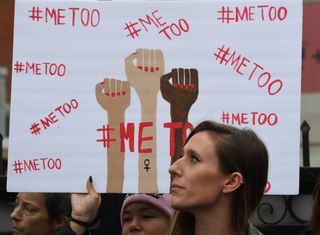Psychology
Fighting Back Against Harassment
The psychology of how hashtags and heel strikes motivate action.
Posted February 18, 2020 Reviewed by Abigail Fagan
By Shabeba Islam and Emily Balcetis

Harvey Weinstein’s jury deliberation is set to start today. Six women testified in the trial, and offered a public voice to the over 80 women who alleged to have been victimized by the film producer.
This high profile case sits alongside many more that preceded and followed it, which together have shifted the power structure of industries from media to medicine, and sparked social movements, including #MeToo and the hashtags that were inspired by it, nearly everywhere. In this post, we'll explain the cultural and psychological sources of power in #MeToo and the motivating forces it inspires to proactively defend against and retroactively respond to violence.
#MeToo has muscle because it combines two fundamental psychological concepts: threat and control. #MeToo has brought awareness to the magnitude of the threat that sexual violence poses to our communities, to our friends and family, and to ourselves. It sheds light on the severe danger that has been and continues to occupy people's experiences. In its first 24 hours #MeToo saw over 12 million posts to Facebook, according to the Associated Press. Since its conception, it has been used in over 85 countries, from Afghanistan to South Korea to France.
But #MeToo also serves as a way to mobilize and fight back. It offered a sense of psychological control that has fundamentally changed the way in which people respond to this threat. The hashtag offered community and solidarity. It catalyzed a form of allyship. For instance, #HowIWillChange was created as a means to engage men and boys in the ongoing discussion about sexual violence.
Researchers from Michigan State University published an analysis of over 3,000 tweets in the latter part of 2019. That study found that those using #HowIWillChange also introduced calls for personal examination of participation in cultures that perpetuate toxic masculinity, a need to listen to women’s experiences, and egalitarianism despite resistance from others who attacked what they called the weakness of men who used #HowIWillChange.
When psychological feelings of danger couple with a sense of personal efficacy, their product can be likened to a chemical reaction. When people feel able to mitigate threat, research finds, they preemptively work to defend themselves and others from harm. And when either of those feelings are gone, they don’t.
A study of Cornell University students found that those who learned that a disease was serious and also untreatable were 70% less likely to ask for a genetic test to diagnose their own susceptibility—this compared to when the disease was mildly serious and untreatable. Additionally, they were 77% less likely to ask for the test under these conditions compared to when the disease was severe and treatable.
Fear of violence, harassment, and attack infiltrate other social domains but the psychological means to responding to them share similarities. Consider the case of Rana Abdelhamid. She is a Muslim woman living in the United States. When Abdelhamid was 16 years old, walking down an ethnically diverse street in Queens, New York, she was physically attacked. A man ran up from behind, grabbed her hijab—a traditional headdress that symbolizes her Muslim faith. He tried again, violently trying to strip it from her head. She turned quickly and saw the hate in his eyes.
What this man did not know was that he chose a victim who could fight back. Abdelhamid’s training in martial arts and the black belt she earned became the mental and physical leverage she needed to meet and overcome her attacker’s advances.
Long before the #MeToo movement started, Abdelhamid was aware of the threat women in particular face, especially Muslim women. According to the British newspaper The Independent, the rate at which mosques in the United Kingdom have been targeted in violent acts of hate including vandalism and arson doubled from 2016 to 2017. The Independent also notes that the number of Anti-Muslim groups in the United States has tripled since the election of Donald Trump. Even countries like India and Sri Lanka, which have significant Muslim populations, have seen a surge in Islamophobic incidents.
In response to what she observed and heard, in 2010 Abdelhamid launched the International Muslim Women’s Initiative for Self-Empowerment, which she calls (IM) WISE. It offers physical defense training including techniques that Abdelhamid herself used during her attack and had to develop specifically for Muslim women with the aim of emancipating Muslim women from disenfranchisement at the hands of their government, xenophobic neighbors, or their very own families. (IM) WISE also provides young Muslim women a safe space to share concerns and receive personal and professional guidance. These workshops, partnerships, and connections offer women agency over their voices and bodies.
In New York City, we have seen the attacks that Abdelhamid faced. As a Muslim woman, I (Shabeba Islam) watched my mother and aunts who wear hijab face off against verbal harassment and condemnation on the streets. I was inspired to learn how other women defend themselves against the real threat they face.
So, I signed up for a self-defense class. I saw girls as young as 13 years of age and mothers with older children who identified as American, Arab, Guyanese, and Bengali gathered together. The strength of the group was palpable.
Abdelhamid walked in the room. She carried herself as a powerful woman. Wearing a hijab and a long flowy skirt, Abdelhamid showed us that she was a badass.
I learned techniques to overpower a man who was twice my size who came at me from the front. I could knock him down if he came from the back. I felt silly. It was awkward. But the first time I countered an attack waged at me from my practice partner, I felt incredible! Only after learning, watching, and doing it myself did I believe in my own ability to keep myself safe.
After class, I spoke with some of the other women there. I asked what (IM) WISE programming did for them. Tamanna Yeasmin said that she has worn a hijab for many years, and described the fear others wear on their faces because of what she was wearing on her head. Yeasmin noted, “Through WISE classes I was able to become physically and emotionally empowered by learning basic defense techniques to use in the events of attacks and also develop entrepreneurship skills. The skills… not only initiated my passion for fighting for women’s rights, but also helped me gain confidence.”
Shahara Ahmed recalled the verbal attacks she experienced starting at the age of twelve. Just as the #MeToo movement brought solidarity to survivors of sexual assault, in this self-defense class, Ahmed realized she wasn’t alone. She told me, “I chose to attend WISE classes because they would be a learning opportunity for me — the thought of having a space with individuals who share similar hopes and fears as me was exciting.”
(IM) WISE tends also to the soul. Mental health disorders are stigmatized in the Muslim community and as a result often go ignored. So too do other disorders. A survey of Australian women who experienced sexual violence found that 97% maintained symptoms of post-traumatic stress disorder. As a result, (IM) WISE includes mental health and personal development programming with an understanding of the cultural complexities that prevent individuals from seeking or receiving proper treatment.
Women in IM (WISE) also engage in professional development workshops. Aspiring leaders showcase their entrepreneurial ideas and receive seed funding. They receive mentorship from other women who can discuss concerns at the forefront of the cultural tension like wearing hijab at the office, concerns about body image, and access to higher education. Young people are partnered with Muslim mentors who work or study in the same field. There is little to no financial cost for the women who participate.
Muslim women like Rana Abdelhamid are working to acknowledge the threat that exists and lift up marginalized women to empower them with the skills needed to defend themselves if and when it is necessary, with a focus on leadership. Hate and violence pervade our communities. But #MeToo and community activists like Abdelhamid offer toolkits to speak up, get out, and make change.
Shabeba Islam is a Masters student at New York University studying the psychology of prejudice.




